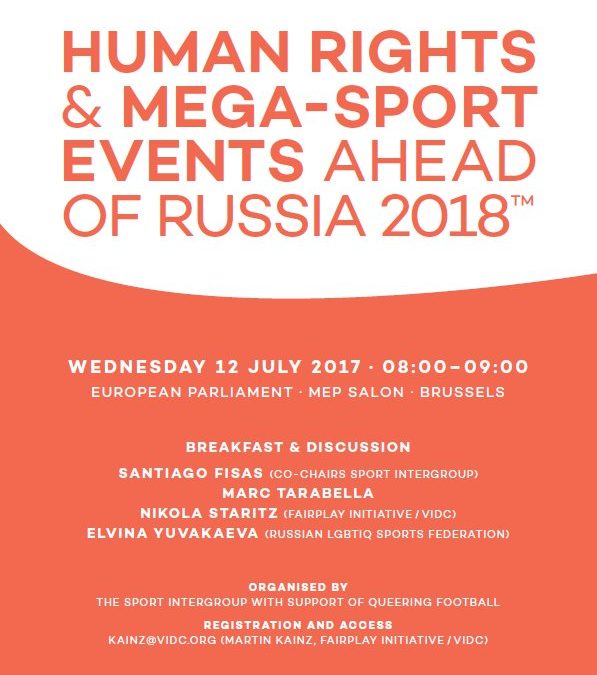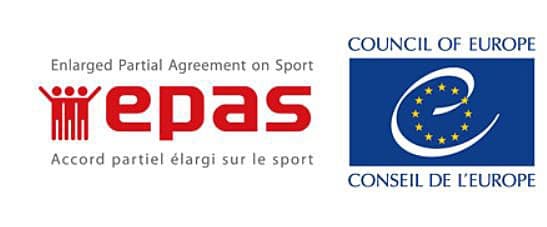
Jul 14, 2017
(Kazan, Russia) The World Players Association today commended UNESCO for highlighting the essential need to safeguard player rights as a cornerstone of any effective approach to protecting the integrity of sport. Further, World Players called upon global sport to adopt a binding policy to embed the human rights of players.
“Integrity in sport as end can only be arrived at through means which themselves are underpinned by integrity,” World Players Association Executive Director Brendan Schwab told the expert forum on protecting the integrity of sport at the Sixth International Conference of Ministers and Senior Officials Responsible for Physical Education and Sport (MINEPS VI).
“And respect for the internationally recognised human rights of the players, workers, spectators and other groups involved in sport is essential if any effort to protect the integrity of sport is to be legitimate and effective.”
To that effect the World Players Association released a new policy today which seeks to ensure that the fundamental rights of players are protected, respected and guaranteed. The World Player Rights Policy articulates the urgent need for international sporting organisations (ISOs) and other relevant sport stakeholders to adopt a player rights policy and spells out the necessary commitments and obligations which any such policy must contain.
“Professional players are subject to extraordinary and complex regulations which deliberately fall outside the scope of national labour law. In the absence of a legal framework to protect them players are left alone in dealing with the considerable risks of their sporting careers. Therefore, sport must commit to put in place reliable and trustworthy processes which protect and uphold the rights of its fundamental stakeholders”, said Schwab.
The player rights commitments laid out in the World Player Rights Policy are built around sport’s implementation of the United Nations Guiding Principles on Business and Human Rights (UNGPs). The UNGPs are a global standard designed to assist business enterprises to avoid adverse impacts on the rights of others and to address such impacts if they occur. They rest on the three-pillar “Protect, Respect and Remedy” framework which requires the adoption of a human rights policy, ongoing due diligence, access to an effective remedy, and transparent reporting.
The commitments and obligations of the World Player Rights Policy provide a similar framework for ISOs enabling them to protect the human rights of the players and to honour core ILO conventions. The failure to respect the fundamental labour rights of players is among a number of risks the new policy identifies as salient which also include the denial to freely access and enjoy sport with equal opportunity. Other identified risks are trafficking, unsafe working conditions, and insufficient data protection.
“Professor John Ruggie’s 2016 report on FIFA convincingly demonstrated how ISOs in their dual role as competition organisers and regulatory bodies should apply the UNGPs to all of their dealing”, added Schwab. “With its recently published Human Rights Policy FIFA has made important progress towards meeting the requirements of the World Player Rights Policy and can make further strides provided its engagement with FIFPro continues to expand.”
The World Players Association is committed to engage with all stakeholders who control sport – ISOs, national sporting organisations, leagues, employers, business and government – to bring the World Player Rights Policy to life and to work in partnership with them to ensure an international sporting environment that is well governed and committed to guaranteeing the fundamental rights of everyone involved in sport, including the players.

Jul 14, 2017
The meeting was hosted on the 12th of July by the Sport Intergroup as a part of “Queering Football” project, with a focus on human rights ahead of 2018 World Cup in Russia. The event has gathered MEPs, representatives from the Commission, FIFA, EOC and NGOs and was an opportunity for interesting discussions on the topic. EU Athletes was present to highlight the importance of respecting athletes’ fundamental rights, which must include the labour rights of professional players in the context of their participation in sporting events.

Jun 17, 2017
SWAFE, the EU Athletes project that aims to empower women athletes in Europe, held a conference in Athens earlier this week. This event gathered 20 different players association from 10 EU countries and various women sports such as handball, rugby, basketball, futsal, Gaelic sport, football, golf, and judo.
The objective of the conference was to offer women athletes from Europe a platform to exchange on best practices but also on the challenges women athletes are facing when they are trying to organise themselves into groups such as player unions.
This first ever event on gender equality organised by EU Athletes was a success and for EU Athletes policy officer Paulina Tomczyk this is just beginning:
” The EU Athletes board have decided that gender equality should be one of our priority. I was really pleased to chair this conference and see that women athletes are trying to get organised everywhere in Europe. It’s the role of EU Athletes to offer them an opportunity to exchange on the challenges they are facing : employment, equal pay, harrassement at the workplace and health and safety issues. We are looking forward to continue this intiative in the near future and we are already in touch with women representatives who couldn’t be present at the conference. This ERASMUS+ funding is a great opportunity for us to invite athletes and athletes representative to share their experience.”
Now the project staff will use the results of the conference to put together a women player’s guide that would be distributed to women players association later this year.

Jun 1, 2017
A Working Group meeting of European Sectoral Social Dialogue Committee for Sport and Active Leisure has taken place in Brussels on the 29th of May 2017. The discussions were mainly focused on the evaluation of the Social Dialogue project concluded this year, fix-term contracts in the sport sector and the Work Plan for Sport 2017-2020 that has been recently adopted by the Council.
The participants have also been informed about the decision of the Austrian court in the case of Vanessa Sahinovic, who after being hit by the bus during European Games in Baku in 2015 became paralyzed. The court, analysing her status as a member of the national team in order to analyze the social security regime, has found that, even without the employment contract and salary, it should be assimilated with labour relation. It is an important development regarding the denial of worker’s status and rights to many athletes in Europe.
The plenary ESSDC meeting will take place in Brussels on the 8th of November 2017.

May 15, 2017
The Consultative Committee of the Enlarged Partial Agreement on Sport under the Council of Europe expresses its concern over the sudden closure of the United Nations Office for Sport Development & Peace, which since the beginning of the century has played an important role as catalyst, adviser and advocate for a wide global group of stakeholders committed to strengthening the role of sport in society.
Given that this decision is very recent and very little information has been given to make a balanced assessment of its impact,
The EPAS CC considers nevertheless that this decision might send a problematic message, at a point in time where the awareness about the societal role of sport is growing in general, and where in particular the UN, several governments and numerous organisations from civil society is wishing to focus on how sport can contribute to achieving the 2030 Sustainable Development Goals (SDG).
The members of the EPAS CC remain committed to the continuation of the work and initiatives developed by UNOSDP and encourage future policies to be defined through a wide collaborative effort among stakeholders in upholding and protecting the role of sport in society.
On behalf of the Consultative Committee, gathered in Limassol, Cyprus, 9 May 2017
Jens Sejer Andersen
Chair
International director, Play the Game
jens@playthegame.org
+45 20 71 07 01
—-
The Consultative Committee comprises 25 international NGO’s and institutions in the sports field. As a partnership body, it provides advice for the 38 countries that are members of the Enlarged Partial Agreement on Sport under the Council of Europe.
EPAS provides a platform for intergovernmental sports co-operation between the public authorities of its member states. It also encourages dialogue between public authorities, sports federations and NGOs. This contributes to better governance, with the aim of making sport healthier and fairer and ensuring that it conforms to high ethical standards.





